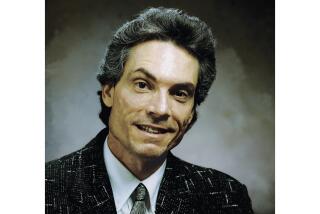‘Insider’ Team Files a Brief for the Defense
- Share via
It’s interesting that print journalists, who have independence at stake, are repeating the distortions of a smear campaign against “The Insider.” If the writers of “Smoke Lingers as ‘The Insider’ Does a Slow Burn” (Dec. 3, by Paul Lieberman and Myron Levin) had been in the crisis at “60 Minutes” in 1995, there’s little doubt which way they’d have gone. They are not Lowell Bergman.
There are so many opinions and falsehoods stated as fact in the article that it would take a treatise to set it right. Additionally, it is unbalanced. To not be so would have required lead writer Lieberman to return our calls or to perform the arduous scholarship of looking stuff up. And it would have required a little skepticism about protests from Brown & Williamson and Mike Wallace and Don Hewitt.
One part of the Wallace-Hewitt spin that goes unchallenged, though contradictory documentation was supplied to your writers, is that they pled helplessness in the face of CBS corporate’s decision not to air Wallace’s interview with former tobacco industry executive Jeffrey Wigand. Walter Cronkite differed: In 1996, he told PBS’ “Frontline”: “The management of ’60 Minutes’ has the power there, quite clearly, to say, ‘I’m sorry. We’re doing this because we must do it. This is a journalistic imperative. We have this story and we’re going with it. We’ve got to take whatever the legal chances are on it.’ Well, they didn’t. They felt it was necessary to buckle under the legal pressures. . . .”
The article also repeats the Wallace complaint that he acquiesced only for a short 24 hours. The film doesn’t clock time, but his protest evades the point: However long it was, it was long enough to condone CBS’ decision to excise an exclusive interview with a whistle-blower on what would become a $246-billion issue. In the process, Bergman’s source was abandoned.
Another example of faux protest is the cry by Wallace that he would never disparage National Public Radio! Meanwhile, the issue he’s evaded is the line of dialogue immediately prior: “What do you think? I’m going to resign in protest? To force it on the air? The answer is ‘no.’ ”
Until their actions were criticized in the media, Hewitt and Wallace accepted the corporate decision. According to a New York Times story (Nov. 9, 1995), “Both Mr. Wallace and Don Hewitt . . . said they agreed with the lawyers’ decision and supported the revised report to be broadcast.” The boosterish Hewitt even bragged that “the revised piece [without Wigand] was better, I think, than what we had before.”
About Bergman and his supposed glorification, Dr. Stanton Glantz, a professor of medicine at UC San Francisco and an anti-tobacco industry veteran who has had frequent dealings with Bergman and appeared on “60 Minutes,” said last month on KCRW-FM’s “Which Way L.A.?”: “Bergman . . . was absolutely obsessed with protecting Jeffrey Wigand. He felt that he had helped facilitate getting Wigand to stick his neck out and that CBS was sawing the limb off behind him. . . . People have said, ‘Is Bergman being portrayed too heroically?’. . . I think in terms of the process--and his faith in the integrity of the process, which was shattered--that’s all very real.”
Regarding the central issue of reportage versus dramatization, when real events are approached from the level of human experience, they come alive in ways that they cannot as news or factual report. That’s what drama does. To protest that “The Insider” is a dramatization, as if drama is automatically tantamount to falseness, is ridiculous. “The Insider’s” dramatization is faithful to the truth.
People are judged by their actions, not their rhetoric. Meanwhile, Hewitt and Wallace continue to address only personal issues of reputation and legacy. None of what they did then or say now addresses the motion picture’s central issues: the compromise of independence in journalism and the totalitarian crush of quite-legal corporate litigation, investigation and smear upon the heart and will of an insider who would speak out.
More to Read
Only good movies
Get the Indie Focus newsletter, Mark Olsen's weekly guide to the world of cinema.
You may occasionally receive promotional content from the Los Angeles Times.










